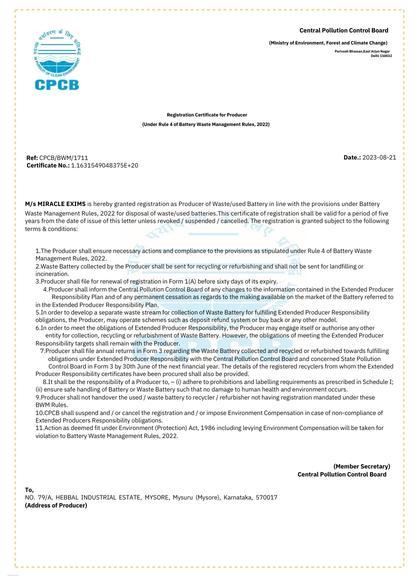Apply EPR License in 1 day and get your Custom Clearance
- Consulted 400 + EPR Registrations
- Free Experts Assistance
- Minimum Price guaranteed
- Quick and Hassle-Free Process
- Free Consultation on Import-Export Compliance
- 20 years experience & Serving more than 1100+ companies
- Providing one stop solution for all Annual compliances
CONTACT US
Our advisor is just a call away
What is EPR Certificate for Import in Tamil Nadu
Extended Producer Responsibility EPR Certification is a first move towards regulations making sure that producers of the products will be responsible for what happens to the product at the end of its life cycle. This certification matters especially in sectors such as electronics, packaging, and plastics.
EPR Certification involves companies developing systems for the collection, recycling, and safe disposal of waste products. Environmental legislation is also something that all businesses need to follow and cooperate with certified waste management companies.
So what are some of the biggest advantages to EPR Certification? It improves brand image, complies with regulations and shows an investment in sustainability. For the environment: it helps conserve natural resources, reduces pollution, and lowers waste.
Achieving EPR Certification represents a crucial milestone for companies aiming to harmonize with international sustainability objectives and minimize their ecological impact.
Process of EPR Registration in Tamil Nadu?
This process of registration is based on several steps for the EPR compliance. Step 1: Identify your type of waste. Next, businesses prepare documentation requirements including GST and operational specifics. These are then uploaded to the CPCB for review.” Once those steps are completed, an EPR certificate is issued, indicating to the business that it is compliant.
What are the documents needed for EPR Registration?
Documents required to successfully register for EPR Businesses must provide documents for EPR, which include a proof of company incorporation, a PAN card, a GST number, details of products, IEC (if engaged in trade), waste management strategy, proof of turnover, and PRO agreements. The need for completeness and accuracy
Regulatory Compliance of EPR Certifications
This is your two part series (Part 1 of 2) for how each Eco-Mark or Eco Label standards are aligned under EPR which eventually follow these steps if you are a manufacturer or producer.
Extended Producer Responsibility (EPR) certification plays an important role for brands in maintaining responsible and sustainable practices. EPR Compliance as a set of responsibilities ensures that producers take care of their products throughout the lifecycle, specifically waste management and recycling.
Companies develop a list of applicable regulations in their industry / region in order to comply with EPR certifications. This means that you’ll need to know what products the EPR requirements apply to, what the reporting standards are, and what recycling or take-back programs are in place. Compliance involves precise documentation of materials utilized in products, as well as transparent reporting of waste management practices.
The design of the product is one of the components of EPR compliance. Businesses are also urged to create products that are easier to recycle, that use fewer harmful substances and which last longer. Not only does this help with compliance, it also allows for innovative and efficient product development, which can reduce costs and increase the product’s attractiveness.
EPR compliance also includes / entails implementing appropriate waste management systems. This would require companies to have stringent take-back processes in place, or ensure that their products can be properly handed over to certified recycling facilities. This generally includes establishing collection points, providing incentives for product returns, and making sure that recycling operations are in compliance with regulatory requirements.
Without regular audits and assessments, compliance cannot be ensured. They highlight areas which need to be improved outside of EPR compliance and provide assurance that all elements of EPR are regularly revised and enforced within the business. This can ease the process, but investing in compliance management software is able to streamline these processes helping you track the progress, managing documentations and generating the necessary reports.
Implementing employee training programs on EPR regulations and sustainability practices can be another consideration. A well-informed workforce is more capable of effectively implementing compliance strategies, promoting a mores of environmental stewardship.
Failure to comply with EPR regulations can lead to heavy fines, legal action, and reputational harm. As a result, EPR compliance needs to be the focus of attention — the legal mandate as well as the business process improving sustainability and operational efficiency.
Essential practices for EPR certification compliance, in conclusion, encompass understanding of regulations, sustainable product design, effective waste management systems, regular auditing, and comprehensive employee training. By following these practices, organizations can maintain compliance, drive sustainable business practices, and contribute to sustainability efforts.
Reach US at:
Contact the Global Solution team at +91 9999253054 or send an email to support2@globalsolution.co.in to discuss the unique requirements for your company. It takes 20 to 25 minutes to discuss needs. Once you’ve discussed the situation with our devoted team, we’ll help you. They will offer answers and all the help you require.
STEP 2- Submission of Required Documents
During EPR Registration for battery waste management, our staff will ask you for the information and supporting paperwork needed.
STEP 3- Payment Process
The government fees can be paid via the site after the required paperwork has been sent; we will provide you more information on the payment process.
STEP 4- Realtime Progress Updates
Our staff allows you to follow the status of your application in real time throughout the registration process.Transparency is ensured by this function, which also keeps you updated on jobs that have been finished and those that are still in process.
STEP 5: Issuing Certificates
After our staff has examined the paperwork, the application is sent to the CPCB, who will examine it and give the necessary certifications. As soon as the procedure is finished, your registration and accreditation will be sent to the email address you supplied.
To satisfy your company’s demands, Global Solution provides efficient and effective solutions. Please do not hesitate to get in touch with us if you want any more assistance or clarification. We’ll be happy to help you with the authorization requirements.
Sample of a EPR Grant Certificate






















